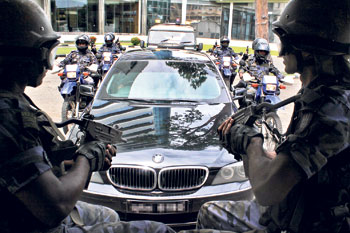He held a flank of ‘Basra’, while all others fell to advancing forces. In fact he pushed the forward defence line across a bridge and secured the area.
Even though it was a mock-up of the ground situation in Iraq during the American invasion in 2003, dubbed “war gaming” at the Army Infantry School at Fort Benning, Georgia, US, the pats on the back for Squadron Leader Chaminda Herath were numerous. For, many were the American officers themselves who were defeated in the Basra operation.
Tough “holding operations” were not new to this 34-year-old Air Force officer because back home in Sri Lanka he had been amidst bitter fighting during the three-decade long war with the Liberation Tigers of Tamil Eelam (LTTE) and faced battles such as Mankulam, strengthening the rear-guard action when the right flank was ordered to withdraw under a massive onslaught by the Tigers.
“There were huge maps of Iraq and the US action was given in real-time at Fort Benning,” says Sq. Ldr. Herath who has also undergone intensive training in Israel.
Basra city was reconstructed and the action simulated. There were laser devices which set off an alarm indicating whether you were dead or injured, he smiles, adding that every action was not only reviewed but also critiqued.
Few, however, when they see the escort vehicles of Acting Chief of Defence Staff and Air Force Commander Air Chief Marshal Roshan Goonetileke would make a link between such skill and expertise and those accompanying the Commander.
But protecting Very Important Persons (VIPs) including the military top brass hit an all-time high with a string of assassinations and attempted ones including the attack on Defence Secretary Gotabhaya Rajapaksa and then Army Commander Lieutenant-General Sarath Fonseka.
Headed by Wing Commander Ravi Jayasinghe, the highly-trained officers including Sq. Ldr. Herath from Bandarawela “who wanted to join the security forces even as a young schoolboy”, Sq. Ldr. Sasanka Mendis and Flight Lieutenant Banuka Bandara are the core of the Special Airborne Force (SABF) along with a small contingent of airmen. They not only form the security detail of the Commander but also meticulously plan the protection of visiting foreign VIPs.
After undergoing a selection test and stringent criteria, including the evaluation by a psychiatrist, these officers are handpicked for rigorous all-round training which encompasses in addition to basic military training, both jungle and urban combat techniques, marksmanship, fire and rescue, heli-borne operations, explosive ordnance disposal, para-medical et al.
 |
 |
 |
| Sq. Ldr. Herath |
Sq. Ldr. Mendis |
Flt. Lt. Bandara |
“We have to keep the person we are protecting alive at any cost,” says Sq. Ldr. Herath, explaining that it is their duty.
That is why they undergo training with all other arms of the security forces – basic course of the Special Forces, VIP protection course of both the Air Force and the Special Task Force, water-borne operations with the Navy, intelligence gathering with the State Intelligence Service etc. Water, ground or air, urban or jungle, they are equipped to protect the VIP in any environment.
Unsure who could be a suicide bomber, the planning of the security arrangements begins well in advance. They pore over maps before route selection for the VIP the next day, analyzing the “existing threats” such as civil unrest and picketing to which they would give a wide berth.
Once they decide on the route, they “dominate” it by deploying people the night before to secure the area and keep it under surveillance. This is mostly done without the knowledge of the public, with many in civvies doing their job unobtrusively while the next morning when the VIP is due to pass through, the area is strengthened by the deployment of airmen in uniform.
The skills and the training of the core group are wide and varied. While Sq. Ldr. Herath “battled” it out in “Basra”, for Sq. Ldr. Mendis, 33, from Balapitiya it was a different kind of ordeal – jungle and mountain survival at an Indian Army centre.
Rina gananata seethalai, he says explaining that the temperature was minus and freezing and they hardly had any food. Such training would help in the event of a VIP they accompanied being in a plane crash, aggravated by cold weather. For 31-year-old Flt. Lt. Bandara unarmed combat and dealing with hijackings are his forte.
Explaining that there were a few attempts to attack the Commander and intelligence reports and surveillance led to the arrest of about six people, Wing Commander Jayasinghe stresses that the SABF is the special and only squadron within the Air Force capable of handling VIP security.
Many have been the times we have recovered explosive devices and fake Air Force uniforms along the routes that the Commander was supposed to take and that’s why we change the systems daily, he says.
Their ultra-efficient surveillance and detections have led to many threats being neutralized, the Sunday Times understands.
Their actions are tried and tested – for before they undertake the security of any foreign VIP, they have to brief the relevant Defence Attache on a threat-assessment. If they are not up to mark – they will not be deployed.
While the letter of appreciation from the Pakistani Air Force Commander Air Chief Marshal Rao Qamar Suleman lauds their “outstanding performance” during his visit to Sri Lanka, for these behind-the-scenes “bodyguards” of top VIPs their record speaks for itself. No one under their care has fallen victim to danger. |





